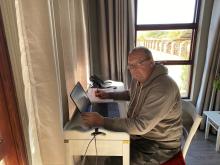
That is the view of industry stakeholders who took part in a webinar hosted by Messe Muenchen South Africa, organisers of the construction, mining, forestry and agriculture machinery sectors trade show, bauma CONEXPO AFRICA.
With the sector expected to lose a further 140,000 jobs due to the lockdown, industry stakeholders involved in the Wednesday 6 May 2020 event said there was an urgent need for a dedicated relief fund for the South African construction sector. They also called for the government to start awarding more projects, and for construction to be allowed to go back to work as soon as possible.
John Matthews, president of Master Builders South Africa (MBSA), noted that the sectors' woes extended beyond the slow economic growth that had crippled it pre-COVID-19. There were also concerns about when the industry would be allowed to go back to work, the costs and impact of new health and safety regulations, and the effects the crisis would have on small businesses and sub-contractors.
"The people who will be hurt the most are the labourers, and this is being compounded by challenges at UIF at the moment, with no real impact of UIF payments reaching the bottom of the scale," said Matthews. "We are punting hard to open existing sites to try and get some work in, as these will incur the greatest costs."
Matthews warned losses would be incurred across the board, adding: "Everyone will have to make some sacrifices – you can't expect anyone in the value chain to be carrying the costs alone."
Kile Mteto, president of The South African Women in Construction & Built Environment (SAWIC & BE), urged relief funding for the sector. "The Solidarity Fund offers very little benefit for the construction industry, but we need support to keep our heads above water. It is very important that funding institutions look at how they make funding accessible. This sector is very capital intensive, and post-COVID-19, most companies will have bad track records. Banks may be giving a break, but they won't write off the debt, so companies will emerge from this without the money to service their debt."
Mteto added that there was a risk of the transformation agenda being sidelined as the public sector rushed to complete urgent infrastructure projects.
The chairman of the Construction and Mining Equipment Suppliers' Association (CONMESA), Calvin Fennell, noted, however: "South Africa won't achieve transformation without the projects being out there. Of 7,332 government tenders issued in the past 12 months, only 27% were awarded. What happened to the rest of them? The transformation would happen faster if the government got these projects out, and got the people into jobs. It's putting the cart before the horse to deliberate at length about transformation without awarding the jobs. We need these projects to go ahead."
Health & safety impacts
Matthews, of MBSA, said: "Health and safety will be absolutely critical to anyone who wants to reengage in employment, and compliance will be a near-impossible task. It could take at least a week to prepare to go back to work, as it's not just about masks and sanitiser. Now is the time to prepare and align with the regulations – do a risk assessment, draft site-specific protocols, and get the professionals in to assist you."
Quintin Booysen, marketing & sales manager of Pan Mixers SA, noted: "The effort that goes into restarting is like starting a new business – things we never thought about will become new realities.
"We don't want to go through a double-dip – having to shut sites or factories down if you aren't compliant or can't cope with COVID-19 outbreaks. The sector has to start preparing now, remembering that we won't start work with the whole team – it's a staged approach that will take a tremendous amount of planning."
Beyond the pandemic
The stakeholders said there were opportunities for the sector to grow after the pandemic, however. Collaboration, new technologies and innovation could position them to become more cost-effective and efficient and so start recovering.
"There are some silver linings," said Mteto. "For example, because of the pandemic, we are looking at different ways of doing business, and we are starting to look at new technologies and methodologies to deliver projects."
Dirk Venter, national sales manager at XCMG, said new technologies were presenting more effective ways of working: "We're seeing GPS location systems and Internet of Things devices used to improve maintenance, monitoring and security, and drones being used to survey areas with great success. This is helping the sector to be safer and more effective," he said.
Suzette Scheepers, CEO of bauma CONEXPO AFRICA organisers Messe Muenchen South Africa, said knowledge sharing and collaboration would also be crucial to helping the sector survive the current challenges. "The fact that there were over 400 participants in this webinar, seeking information and expert insight, is an indication of how important niche knowledge sharing is in the construction industry. bauma CONEXPO AFRICA is designed to promote networking and information sharing and has been re-engineered to deliver enhanced cross-sector growth opportunities in sub-Saharan Africa."










